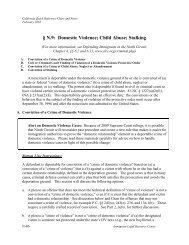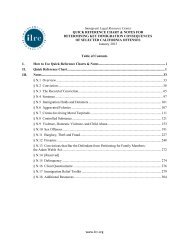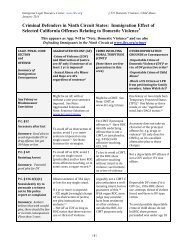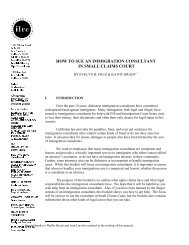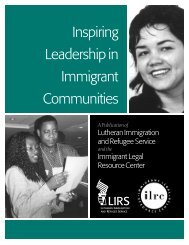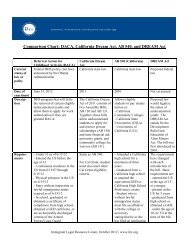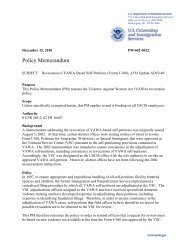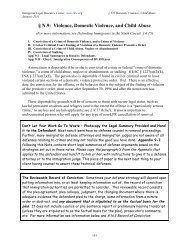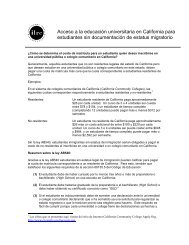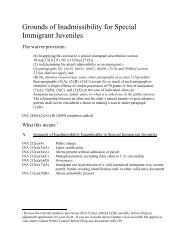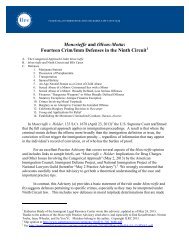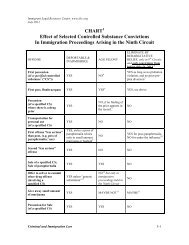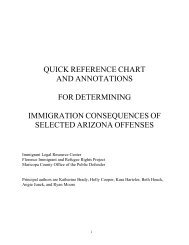POST-CONVICTION RELIEF IN CALIFORNIA SHOULD BE ... - ILRC
POST-CONVICTION RELIEF IN CALIFORNIA SHOULD BE ... - ILRC
POST-CONVICTION RELIEF IN CALIFORNIA SHOULD BE ... - ILRC
Create successful ePaper yourself
Turn your PDF publications into a flip-book with our unique Google optimized e-Paper software.
<strong>POST</strong>-<strong>CONVICTION</strong> <strong>RELIEF</strong> <strong>IN</strong> <strong>CALIFORNIA</strong><br />
<strong>SHOULD</strong> <strong>BE</strong> UNAFFECTED BY CHAIDEZ v. UNITED STATES<br />
Michael K. Mehr, for Immigrant Legal Resource Center<br />
In Chaidez v. United States, 568 U.S. _____, ____S.Ct.____, 2013 WL 610201,<br />
(February 20, 2013) the U.S. Supreme Court held that Padilla v. Kentucky, 559 U.S. 356 (2010)<br />
was a “new rule” that did not apply retroactively to convictions final before March 31, 2001. In<br />
Padilla, the Supreme Court held that the Sixth Amendment requires criminal defense counsel to<br />
advise a noncitizen about the immigration consequences of a guilty plea.<br />
In California state courts, post-conviction relief based on ineffective assistance of<br />
counsel for failure to advise about immigration consequences should be largely unaffected<br />
by this opinion. California courts have held for over 25 years that criminal defenders have<br />
this obligation under Article I, §15 of the California Constitution as well as the Sixth<br />
Amendment to the U.S. Constitution. Since 1987 in California, criminal defense counsel<br />
have been obligated to advise noncitizen criminal defendants about the actual and specific<br />
immigration consequences of conviction. (People v. Soriano (1987) 194 Cal.App.3d 1470,<br />
1478-79, 240 Cal.Rptr. 328).<br />
The Supreme Court in Chaidez acknowledged that Padilla’s ruling answered an open<br />
question about the Sixth Amendment’s reach “in a way that altered the law of most jurisdictions”<br />
and in so doing, broke new ground and imposed a new obligation.” (Emphasis added.) Since<br />
California’s law was not altered by Padilla, courts in California must apply its pre-Padilla<br />
case law which pre-dated Padilla by more than 25 years, to claims of ineffective assistance<br />
of counsel.<br />
Following the rule set forth in People v. Soriano, a California Court of Appeals panel in<br />
1989 made explicit what was only implicit in Soriano: the duty to advise about immigration<br />
consequences also includes the duty to defend against those consequences. People v. Barocio,<br />
(1989) 216 Cal.App.3d 99 (failure to file judicial recommendation against deportation or seek<br />
364 day sentence is ineffective assistance of counsel). This was also the holding in People v.<br />
Bautista (2004) 115 Cal.App.4th 229 (counsel correctly told the defendant that he “would” be<br />
deported for possession of sale conviction, but failure to attempt to plead up to “offer to sell” or<br />
“transportation” may be ineffective assistance of counsel).<br />
Since People v. Soriano has been binding on criminal counsel and state courts since<br />
1987, the “new rule” announced by Padilla for other jurisdictions was already the “rule” in<br />
California for the prior 25 years. People v. Soriano merely reached the correct result 25 years<br />
earlier than Padilla. Additionally, People v. Soriano was expressly based not only on the Sixth<br />
Amendment, but also on Article I, §15 of the California State Constitution. Id. at 1478-79.<br />
States must enforce minimum federal constitutional standards, but are free to adopt additional<br />
protections. (Reynolds v. Superior Court (1974) 12 Cal.3d 834, 842, 117 Cal.Rptr. 437; Cal.
© Immigrant Legal Resource Center, www.ilrc.org<br />
April 2011<br />
Const., Art. I, §24 (declaring that “[r]ights guaranteed by this Constitution are not dependent on<br />
those guaranteed by the United States Constitution.”))<br />
While the California Supreme Court in 2001 stated in dictum that it was “unpersuaded”<br />
as to whether a failure to advise was ineffective assistance of counsel, that case only addressed<br />
affirmative misadvice and expressly stated that “this case does not allege a mere failure to<br />
investigate, so the question is not squarely presented.” (In re Resendiz (2001) 25 Cal.4th 230,<br />
249-250). In re Resendiz did not overrule People v. Soriano or People v. Barocio. Therefore,<br />
criminal defense counsel and lower state courts were bound to follow those opinions. (Auto<br />
Equity Sales, Inc. v. Superior Court (1962) 57 Cal.2d 450, 456) (“Under the doctrine of stare<br />
decisis, all tribunals exercising inferior jurisdiction are required to follow decisions of courts<br />
exercising superior jurisdiction.”)<br />
Chaidez v. United States only affects the vast majority of jurisdictions–unlike<br />
California–which did not have case law requiring criminal defenders to advise noncitizens<br />
about the immigration consequences of conviction prior to the Padilla decision.<br />
For jurisdictions other than California, Chaidez does not affect affirmative misadvice<br />
claims since Chaidez distinguished affirmative misadvice claims as not subject to its retroactivity<br />
holding since this “separate rule for material misrepresentations” pre-existed Padilla.<br />
Furthermore, in other jurisdictions, defenders may be able to argue that 1) state retroactivity<br />
principles mandate application of Padilla to conviction final before March 31, 2010 under<br />
Danforth v. Minnesota, 552 U.S. 264 (2008), 2) the defense lawyer also violated an established<br />
constitutional duty such as failing to negotiate effectively to mitigate harm in the plea, 3) that<br />
Padilla applies in a first post-conviction proceeding because such a proceeding is the equivalent<br />
of a direct appeal for purposes of an ineffective assistance claim, or 4) there are independent<br />
state grounds to provide a remedy.<br />
For another article for California post-conviction relief after Chaidez see Norton<br />
Tooby, “Implications of Chaidez for California Defense Counsel” at:<br />
http://nortontooby.com/pdf/free-newsletter-archives/December%202012.pdf.<br />
For national strategies, see “Seeking Post-Conviction Relief under Padilla v. Kentucky<br />
after Chaidez v. U.S.” by Immigrant Defense Project and National Immigration Project at:<br />
http://www.nationalimmigrationproject.org/legalresources/practice_advisories/Chaidez%20practi<br />
ce%20advisory%203-1-2013..pdf.<br />
For an examination of Padilla v. Kentucky and California case law, see Norton Tooby,<br />
“Implications of Padilla v. Kentucky for California Defense Counsel” at:<br />
http://www.capcentral.org/criminal/articles/docs/ImplicationsofPadilla.pdf<br />
Please contact <strong>ILRC</strong> if you encounter problems in California state courts concerning<br />
Chaidez v. United States.<br />
2



